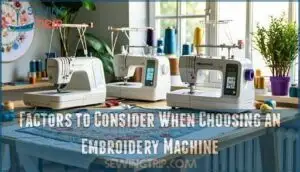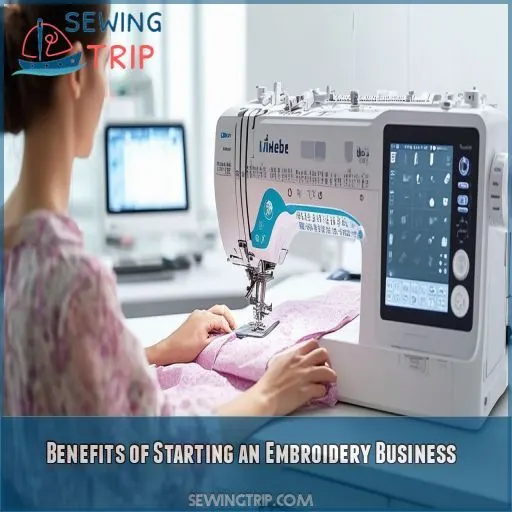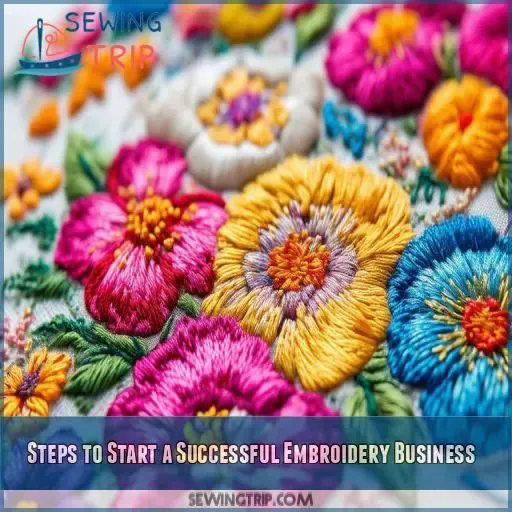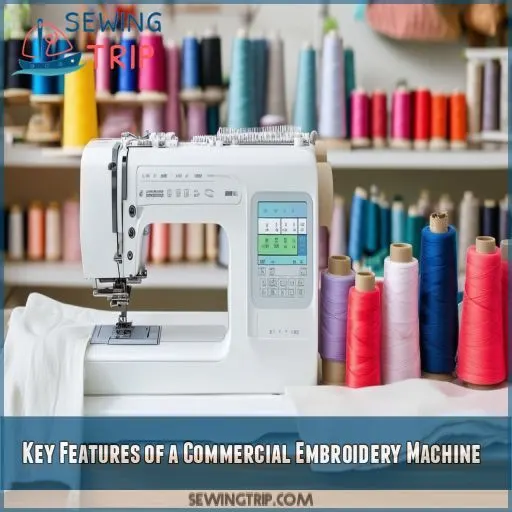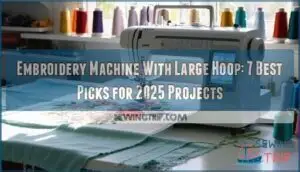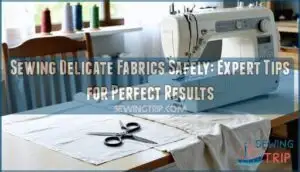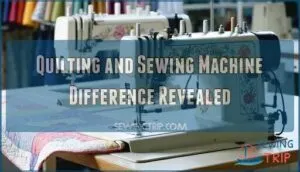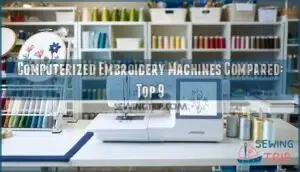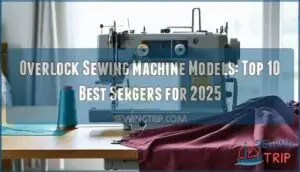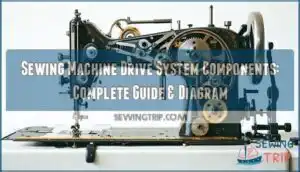This site is supported by our readers. We may earn a commission, at no cost to you, if you purchase through links.
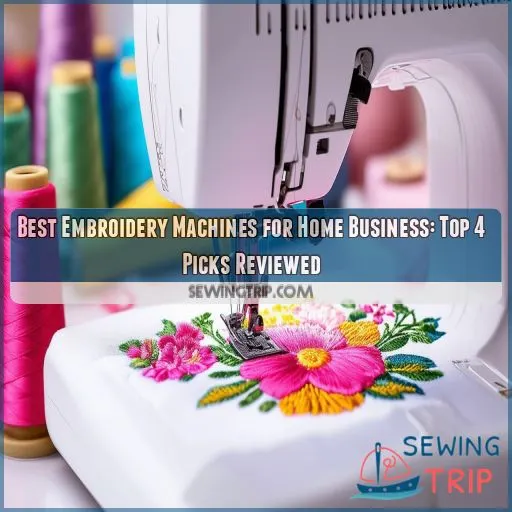 You’re in luck! We’ve reviewed the best embroidery machines for home business, and our top picks include the Brother PE800, Brother PE770, Singer SE340 Legacy, and Janome Memory Craft.
You’re in luck! We’ve reviewed the best embroidery machines for home business, and our top picks include the Brother PE800, Brother PE770, Singer SE340 Legacy, and Janome Memory Craft.
These machines offer a perfect blend of design capabilities, ease of use, and value. With features like ample hoop sizes, user-friendly interfaces, and diverse design libraries, they’ll help you create stunning embroidery products.
Stick around to discover how these machines can turn your creative passion into a thriving business.
Table Of Contents
Key Takeaways
- Picture yourself stitching your way to entrepreneurial success, needle and thread in hand, as you explore top-tier embroidery machines like the Brother PE800, PE770, Singer SE340, and Janome Memory Craft. These machines are a creative powerhouse, blending design prowess, user-friendly interfaces, and budget-friendly prices – the perfect recipe for turning your embroidery passion into a thriving home business!
- When launching your embroidery empire, don’t forget to prioritize customer delight. Go the extra mile with exceptional service, actively seeking feedback, and fostering a vibrant community. Treat every embroidered creation like a masterpiece, and watch word-of-mouth buzz propel you to dizzying heights of success.
- Imagine the possibilities that unfold when you invest in a high-quality embroidery machine, complete with robust embroidery fields, ample memory, lightning-fast speeds, and a plethora of user-friendly features. It’s like having a magic wand in your hands, empowering you to conjure up designs that leave customers spellbound.
- From mastering digitizing techniques and leveraging software compatibility to experimenting with specialty threads and stabilization methods, your embroidery machine’s design capabilities are the keys to unlocking a world of creativity. Prepare to have your mind blown by the sheer artistry you can produce with the right tools and techniques at your disposal!
Top 4 Embroidery Machines for Home Business
You’ll find the Brother PE800, Brother PE770, Singer SE340 Legacy, and Janome Memory Craft among the top embroidery machines for your home business. These machines offer a balance of features, performance, and price that make them well-suited for small-scale commercial embroidery projects.
1. Brother PE800 Embroidery Machine
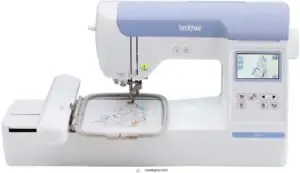
The Brother PE800 embroidery machine is your gateway to a thriving home business. With 138 built-in designs and 11 fonts, you’ll master a wide range of embroidery styles.
The 5"x7" embroidery field liberates your creativity, while the 3.2" LCD touchscreen puts control at your fingertips. Its USB port lets you import custom designs, freeing you from limitations.
This machine tackles virtually any fabric with ease, giving you the power to captivate customers.
Best For: Home businesses looking to expand their embroidery offerings.
- 138 built-in designs and 11 fonts
- 5"x7" embroidery field
- USB port for importing custom designs
- Only 1 USB port
- Cannot change bobbins in between colors without detaching the hoop
- Cannot change multi-colors to a single color and change timings
2. Brother Embroidery Machine PE770
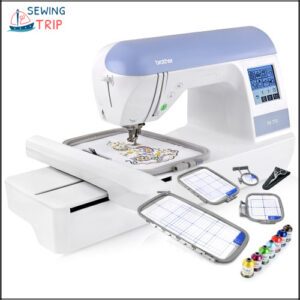 View On Amazon
View On Amazon
Your embroidery dreams take flight with the Brother PE770. This powerhouse boasts a generous 5" x 7" embroidery field, perfect for personalizing jackets, bags, and home décor.
With 136 built-in designs and 6 fonts, your creativity knows no bounds. The 1.4" x 2.7" LCD color touchscreen puts design editing at your fingertips, while the USB port welcomes your custom creations.
Auto thread cutting ensures precision, and Brother’s 25-year warranty and free tech support have your back.
Master your craft and liberate your business potential with the PE770.
Best For: Crafters, designers, and small businesses seeking a versatile embroidery machine.
- Spacious 5" x 7" embroidery field for larger designs
- USB port for importing custom embroidery designs
- Built-in designs and fonts for endless creative possibilities
- Requires software for design manipulation (not included)
- May be too large for some users
- Some users may find the LCD touchscreen controls to be small
3. Singer SE340 Legacy Sewing Embroidery Machine
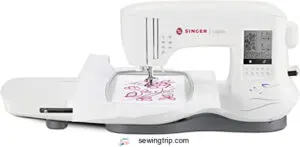
The Singer SE340 Legacy is a powerhouse for your home embroidery business. With 200 embroidery designs and 6 alphabet options, it’s like having a creative goldmine at your fingertips.
The extra-large 10¼" x 6" embroidery area lets you tackle big projects with ease. Plus, the included Professional Sew-Ware Software Deluxe Edition is your secret weapon for advanced editing and digitizing. It’s like having a design studio in your spare room.
And with a universal power supply, you’re ready to stitch your way to success anywhere.
Best For: Hobbyists and entrepreneurs looking to expand their embroidery capabilities with a versatile machine.
- Extensive embroidery options with 200 designs and 6 alphabet choices
- Extra-large embroidery area accommodates large projects
- Advanced software suite for editing and digitizing designs
- Limited to 110 volts in the US and Canada
- May require additional accessories for specific embroidery techniques
- Price point may be higher than some entry-level embroidery machines
4. Janome Memory Craft Embroidery Machine
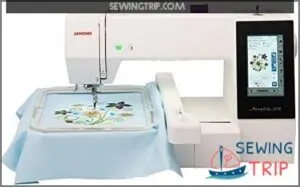
The Janome Memory Craft 500E is a powerhouse for your home embroidery business. With a generous 7.9" x 11" embroidery area, you’ll breeze through large designs without constant rehooping.
Its full-color touchscreen and advanced editing functions put you in control, allowing you to manipulate designs with ease. The automatic thread cutter and advanced needle threader streamline your workflow, while the direct USB transfer of designs saves precious time.
Despite some minor thread issues, its quiet operation and large work area make it a solid choice for serious embroiderers.
Best For: Home embroidery businesses and serious embroiderers seeking a powerful and feature-rich machine.
- Large embroidery area
- Advanced editing functions
- Quiet operation
- Thread breakage issues
- Bobbin thread showing
- Grinding noises in bobbin area
Factors to Consider When Choosing an Embroidery Machine
When selecting an embroidery machine for your home business, consider key factors such as design capabilities, ease of use, price, hoop size, materials, connectivity, LCD screen, and speed. These features will directly impact your production efficiency, design versatility, and overall customer satisfaction, making it essential to evaluate each factor carefully before making your purchase.
Design Capabilities
Now that you’ve got your machine, let’s talk design magic.
Your embroidery machine’s design capabilities are like your superhero powers.
With excellent digitizing techniques and design software compatibility, you’ll create stunning, crisp designs that’ll make your customers swoon.
Don’t forget specialty thread types for that extra pizzazz!
Master embroidery stabilization methods to keep your designs intact, even after washing.
Your home machine brand’s built-in designs are just the tip of the iceberg.
Ease of Use
After design capabilities, you’ll want an embroidery machine with an auto-digitizing user-friendly interface, allowing on-screen editing, thread tension adjustment, and color blending for flawless designs. Ease of use is essential for home business owners and aspiring entrepreneurs – look for machines with a gentle learning curve and features designed to simplify the embroidery process.
Price
You’ll want to examine your pricing strategy thoroughly, as affordability concerns are prevalent when initiating an embroidery business. Fortunately, you’ll discover:
- Cost-effective options from home embroidery brands
- Funding options for commercial brands
- Pre-owned or offshore machines for lower price points
Conduct a detailed cost-benefit analysis to identify the most suitable embroidery machines for your home business requirements and financial plan.
Hoop Size
You’ll want an embroidery machine with a larger hoop size to accommodate bigger projects. Most home machines have 5"x7" or 6"x10" hoops, but if you plan on stitching larger items like totes or jacket backs, look for hoops up to 8"x12". Keep in mind hoop shape matters too – rectangular frames give you more versatility than circles.
Materials
You’ll want to examine the materials you’ll be working with: some fabrics and textures require specific needles and threads. Make a list of:
- Thick fabrics like denim or canvas
- Delicate materials like silk or satin
- Unusual textures like fur or leather
Choose a machine suited for your needs, and consult your dealer for attachments. Quality, multi-purpose machines offer flexibility and dealer support.
Connectivity
You’ll want an embroidery machine with connectivity options like a USB port or Bluetooth to easily transfer embroidery designs.
This allows you to tap into online resources, your existing design library, and expand your creative offerings to attract more customers for your home embroidery business.
Staying connected gives you a competitive edge in meeting the diverse needs of your target market and embroidery enthusiasts.
LCD Screen
You’ll also want to evaluate the LCD screen size and quality. A large, high-resolution color touchscreen makes it easier to view designs and navigate menus. Look for at least a 3" x 3" display with accurate color representation. An intuitive user interface streamlines the design process, letting you focus on creativity over wrestling with tech woes.
Speed
When starting an embroidery business, you’ll want a machine that can keep up with demand. Look for high-speed operation, with machines capable of 1,000+ stitches per minute. Multiple needles and automatic thread changes boost efficiency, while a large embroidery field accommodates bigger projects. The Janome 001MB7, for example, boasts 10 needles and a generous 15"x12" work area.
Benefits of Starting an Embroidery Business
An embroidery business offers high profitability by providing personalized and customized products with relatively low overhead costs. With minimal barriers to entry, such as limited space requirements and the ability to start small, commencing an embroidery business provides flexibility, independence, a creative outlet, and potential tax advantages for home-based entrepreneurs.
High Profitability
With the right approach, your embroidery business can yield impressive profit margins. Here’s how to maximize profitability:
- Conduct thorough market research
- Identify lucrative target demographics
- Develop strategic marketing plans
Low Barriers to Entry
You’ll find an embroidery business is easy to start with minimal market barriers. Thorough market research and competitor analysis reveal evolving industry trends. Identify underserved niches through product differentiation for a competitive edge. With strategic planning and savvy niche identification, you can establish a thriving embroidery venture from home.
Flexibility and Independence
Starting your home-based embroidery business allows you to be your own boss, freeing you from the 9-to-5 grind. You’ll have the flexibility to set your own hours and focus on specialized market niches aligning with your interests. Engaging directly with customers through personalized marketing strategies and online sales channels puts you in control.
Creative Outlet
You crave an outlet for your creativity. Embroidery provides a canvas to express your artistic talents through 1) vibrant color palettes, 2) innovative design patterns, and 3) unique material combinations. Personalize your creations while tapping into an endless well of design inspiration. User reviews and marketing ideas abound—embroidery ignites your passion and profits.
Tax Advantages
You’ll enjoy tax advantages when running an embroidery business from home. Explore tax laws to claim deductions for equipment, supplies, and workspace. Embracing tax implications early secures compliance and maximizes tax incentives available for small businesses. Proper planning enables valuable tax breaks and significant tax savings that boost profitability.
Steps to Start a Successful Embroidery Business
Starting a successful embroidery business demands focused planning and strategic execution.
Identify your unique competitive advantages, such as specialized designs or niche markets.
Define your target audience based on demographics and preferences.
Prioritize exceptional customer service through efficient order fulfillment and open communication.
Invest wisely in high-quality equipment suited to your business needs.
Develop inclusive marketing strategies leveraging both online and offline channels to build brand awareness and drive sales.
Identify Competitive Advantages
To identify competitive advantages, you’ll need to:
- Conduct thorough market research
- Analyze operating costs for effective pricing
- Develop a competitive pricing strategy
- Leverage social media for effective marketing
- Establish a unique branding strategy
Understanding your strengths and leveraging them is essential for standing out in the embroidery business market.
Define Target Audience
Identifying your target market is essential. Conduct thorough market analysis and customer segmentation to pinpoint your niche. Consider factors like demographics, interests, and purchasing behavior. Audience research helps tailor your offerings and marketing strategies effectively.
| Target Market | Customer Segmentation | Niche Identification |
|---|---|---|
| Age, income | Interests, needs | Styles, occasions |
| Location | Buying habits | Customization levels |
| Gender | Brand loyalty | Materials |
Prioritize Customer Satisfaction
Prioritizing customer satisfaction will unleash exponential growth. 1) Provide exceptional customer service to foster loyalty and repeat business. 2) Actively seek customer feedback to continually improve offerings. 3) Leverage word-of-mouth marketing through delighted customers. 4) Engage on social media for responsive support and community-building. Customer delight translates into a thriving home embroidery business.
Invest in High-quality Equipment
To guarantee your embroidery business prospers, you must invest in high-quality equipment. A sturdy machine with ample hoop space, memory, and speed is imperative. Don’t scrimp on accessories like stabilizers, thread, and software either. Regular maintenance and training will also maximize your machine’s lifespan. Consider this an investment that pays dividends:
| Accessory | Maintenance | Training |
|---|---|---|
| Stabilizers | Regular Cleaning | Certification Courses |
| Thread | Lubrication | Online Tutorials |
| Software | Repairs | Hands-on Workshops |
Develop Marketing Strategies
To drive your embroidery business success, develop a multi-faceted marketing strategy.
Start by building brand awareness through a strong social media strategy, engaging potential clients with visually appealing posts.
Launch targeted email campaigns to nurture leads and showcase your latest designs.
Leverage affiliate marketing to expand your reach, and optimize your website for SEO to attract organic traffic.
These tactics will help you gain control and master your market.
Key Features of a Commercial Embroidery Machine
When selecting a commercial embroidery machine for your home business, prioritize features like maximum embroidery area, memory size, usability, financing options, and available attachments. These key factors will determine your machine’s productivity, design flexibility, ease of operation, affordability, and ability to handle diverse projects, ensuring your business’s success and growth.
Maximum Embroidery Area
After prioritizing customer satisfaction and investing in high-quality equipment, it’s significant to contemplate the maximum embroidery field. This feature determines the size of designs you can create, directly impacting your business’s versatility. For instance:
- Brother PE800 offers a 5" x 7" hoop, perfect for monograms and logos.
- Brother SE340 provides a 4" x 4" field, ideal for smaller items like caps.
- Janome Memory Craft boasts a spacious 7.9" x 7.9" area for larger projects.
Choose a machine that aligns with your product range and target audience.
Memory Size
After ensuring your machine accommodates large designs, consider its memory capacity.
You’ll want ample digital storage to save your creations for future use. A robust memory size lets you store hundreds of patterns without worrying about running out of space.
This file storage flexibility empowers you to build a library of designs, saving time and allowing you to quickly access your most popular embroidery patterns.
Usability
Regarding usability, you’ll need a machine that simplifies your workflow. Seek an intuitive interface that streamlines the learning process, enabling you to focus on your creations rather than technicalities. Consider machines with interchangeable needle types that adapt to various fabrics and provide detailed maintenance instructions. Ultimately, a user-friendly machine empowers your creativity without hindering it.
Financing
You’ve got the skills, the passion, and the perfect machine in mind.
Now, let’s talk money. Financing your commercial embroidery machine isn’t just about buying equipment; it’s about fueling your dream.
Create a solid business plan that outlines your funding options, marketing strategy, and customer acquisition tactics.
With smart financing, you’ll keep your profit margins healthy and your business stitched together for success.
Attachments
Once you’ve secured financing, it’s time to explore attachments for your commercial embroidery machine. These accessories can transform your machine into a versatile powerhouse.
From cap attachments for trendy headwear to sequin devices for dazzling designs, each upgrade empowers you to access new market opportunities. Don’t overlook tubular frames for bags or jacket backs.
Frequently Asked Questions (FAQs)
Which embroidery machine is best for home use?
Like Aladdin’s magic carpet, your ideal embroidery machine whisks you into a world of creative mastery. For home use, consider the Brother SE1900 or SE600, offering a blend of user-friendly features and professional-quality stitches to liberate your designs.
Is a home embroidery business profitable?
You’re onto something! A home embroidery business can be highly profitable. With low startup costs, flexible hours, and a growing market for personalized items, you’ll tap into your creativity while mastering your craft and controlling your financial future.
Which is the best industrial embroidery machine?
You’ll thrive with the Tajima TEJT-C Series or the Barudan BEXT-S Series. Both offer rock-solid reliability, high-speed performance, and user-friendly interfaces. Choose based on your budget, dealer support, and specific embroidery needs.
How to choose the right embroidery machine?
Choose your embroidery machine based on your business needs. Consider factors like hoop size, stitches per minute, connectivity, and built-in designs. Don’t forget durability and dealer support. It’s your creative liberation tool—make it count!
How do I price my embroidery services competitively?
Like threading a pricing needle, balance your costs, market rates, and value. Research competitors, calculate materials and time, and factor in your expertise. Offer tiered pricing for different services to attract diverse clients and maximize profits.
What are the best digitizing software options for beginners?
For beginners, Wilcom EmbroideryStudio and Hatch Embroidery digitizing software are excellent options. They offer user-friendly interfaces, tutorial videos, and affordable pricing to help you start digitizing designs with ease.
How can I market my embroidery business online effectively?
Take Jane’s example – she marketed her embroidery via social media, offering contests and sharing behind-the-scenes videos that humanized her brand. Be strategic: identify your niche, analyze competitors, and build an engaging online presence that resonates with potential customers.
What maintenance routines keep embroidery machines running smoothly?
Keep those embroidery machines purring. Lint buildup can jam delicate parts, so clean obsessively after each project. Lubricate moving components sparingly based on your manufacturer’s guidance. Replacing worn parts like needles and hoops guarantees pristine stitching every time. Maintaining your machine’s health means it’ll keep working hard for you.
Are there licensing requirements for selling embroidered products?
Typically, you won’t need licensing to sell embroidered products made at home. However, if using copyrighted images or brands, obtain proper permissions to avoid legal issues. Follow local business regulations for any required licenses or permits.
Conclusion
Ultimately, investing in the best embroidery machines for home business like the Brother PE800, PE770, Singer SE340, or Janome Memory Craft can catapult your creative venture to new heights.
With their impressive design capabilities, user-friendly interfaces, and remarkable value, these top-tier machines empower you to produce stunning embroidery, captivate customers, and foster your entrepreneurial success.
Don’t settle for less – seize the opportunity to elevate your home business with these outstanding embroidery machines.

